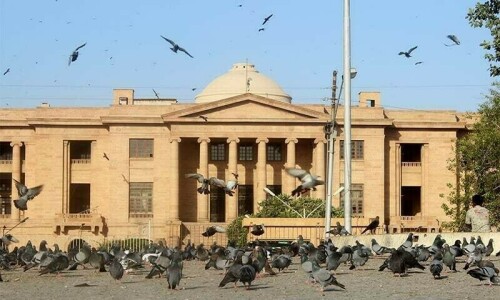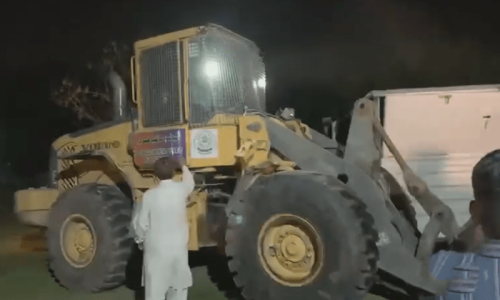
BEIRUT: The Syrian regime was accused Sunday of dropping cluster bombs - indiscriminate scatter-shot munitions banned by most nations - in a new sign of desperation and disregard for its own people.
The international group Human Rights Watch cited amateur video and testimony from the front lines in making the allegation against the government of President Bashar Assad. Syria and Turkey, meanwhile, declared their skies off-limits to each other amid mounting cross-border tensions in Syria's 19-month-old conflict, now a civil war. Turkey is an outspoken backer of rebels trying to oust Assad.
The weekend's mutual ban on overflights is part of Turkey's increasingly assertive stance toward Syria that has stirred concerns about a regional conflagration. In the past two weeks, Turkey has retaliated for stray Syrian shells and mortar rounds, intercepted a Syrian passenger plane on suspicion it carried military equipment, and - according to a Turkish newspaper Sunday - sent more warships to naval bases north of the Syrian coastline.
Inside Syria, rebel fighters and regime forces have been locked in a bloody stalemate for weeks, with rebels holding large rural stretches in the heavily populated western area, but unable to dislodge Assad's troops from urban centers. During the summer, the regime escalated shelling and airstrikes on rebel-held neighborhoods.
Human Rights Watch said new amateur videos and interviews with residents suggests the Syrian air force has dropped cluster bombs in the past week, mainly along a main north-south highway in western Syria that runs through Maaret al-Numan, a town captured by rebels after fierce fighting.
Cluster bombs open in flight, scattering smaller bomblets over a wide area. Many of the bomblets don't explode immediately, posing a threat to civilians long afterward.
Steve Goose, an arms expert for the New York-based human rights group, said most nations have already banned cluster bombs and that many of those who haven't, including the United States, said they would do so soon. ''These are weapons that are really beyond the pale,'' Goose said in a phone interview. ''This is a weapon of desperation (for Syria) at this point in time. Only those governments and political leaders who are willing to thumb their nose at international opinion will use these weapons.''
The Syrian government had no immediate comment.
First word of cluster bombs being dropped by the regime emerged in July, but the recent reports indicated a more widespread use, said Nadim Houry, a Lebanon-based researcher for Human Rights Watch.
Sunday's report said activists posted at least 18 videos in the past week showing remnants of the bombs in or near the central city of Homs, the northern cities of Idlib and Aleppo, rural areas near the town of Latakia and the eastern Ghouta district close to the capital of Damascus. The group also spoke to residents in the towns of Taftanaz and Tamane who said cluster bombs were dropped in their areas on Tuesday.
There was no immediate report of casualties from the recent cluster bombs, the report said, adding that the munitions shown in the videos were made in the Soviet Union, a major arms supplier to Syria before its collapse in 1991.
Amateur videos cannot be confirmed independently because Syria restricts access to foreign journalists and the government keeps a tight lid on news related to the conflict, which it blames on a foreign conspiracy. Cluster bombs have also been used in other recent conflicts in the region, including by forces loyal to Libyan leader Moammar Gadhafi, who was toppled in a bloody uprising last year, and by Israel in its 2006 war with the Lebanese Hezbollah militia. U.N. demining experts have said hundreds of thousands of bomblets dropped over Lebanon failed to explode.
The death toll in Syria's civil war crossed the threshold of 33,000, according to the Britain-based Syrian Observatory for Human Rights, which gathers reports from a network of activists. The group said it counted 33,204 dead as of Friday, including 23,752 civilians or civilians-turned-rebel gunmen, 1,241 army defectors fighting with the rebels and 8,211 regime soldiers.
In Turkey, the leader of Syria's main opposition group complained that the international community is doing little more than managing the conflict. The rebels' foreign backers, including Turkey, have shied away from direct military intervention, fearing to get dragged into a quagmire without an exit strategy. Abdelbaset Sieda, who heads the Syrian National Council, told reporters in Istanbul that the international community must establish safe havens in Syria and enforce no-fly zones to help the rebels counter the regime's airstrikes.
This would also cut down on the number of Syrians seeking refuge abroad and ''resolve the humanitarian crisis, especially with winter approaching,'' Sieda said. International aid officials estimate the number of refugees could double by the end of the year, to more than 700,000.












































